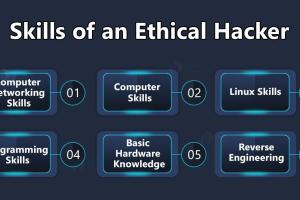8 Essential Tips to Become a Qualified and Professional Ethical Hacker

-
Quick Links:
- 1. Understand the Basics of Ethical Hacking
- 2. Acquire Relevant Certifications
- 3. Gain Practical Experience
- 4. Learn Programming Languages
- 5. Master Networking and Security Concepts
- 6. Stay Updated with Emerging Threats
- 7. Build a Professional Network
- 8. Create a Portfolio of Your Work
- FAQs
1. Understand the Basics of Ethical Hacking
Ethical hacking is the practice of intentionally probing networks, systems, and applications to find vulnerabilities that could be exploited by malicious hackers. To embark on your ethical hacking journey, it's crucial to understand the foundational concepts. This includes:
- Types of hackers: White hat, Black hat, Gray hat.
- Common hacking techniques and tools.
- The ethical implications of hacking.
Familiarize yourself with terms such as penetration testing, vulnerability assessment, and the different phases of ethical hacking.
2. Acquire Relevant Certifications
Certifications play a vital role in establishing your credibility as an ethical hacker. Some of the most respected certifications include:
- Certified Ethical Hacker (CEH): A comprehensive certification that covers a wide array of hacking techniques.
- Offensive Security Certified Professional (OSCP): A hands-on certification that emphasizes practical skills.
- CompTIA Security+: A foundational certification that covers essential cybersecurity concepts.
Each certification has its unique value and requirements, so choose the one that aligns best with your career goals.
3. Gain Practical Experience
Theoretical knowledge is essential, but practical experience is paramount in ethical hacking. Start by:
- Setting up a home lab using virtual machines.
- Participating in Capture The Flag (CTF) competitions.
- Contributing to open-source security projects.
By applying your skills in real-world scenarios, you'll build confidence and competence as an ethical hacker.
4. Learn Programming Languages
Understanding programming languages is crucial for an ethical hacker. Here are the languages you should consider learning:
- Python: Widely used for scripting and automating tasks.
- JavaScript: Important for web application testing.
- SQL: Essential for database manipulation and understanding SQL injection attacks.
Being proficient in these languages will enhance your ability to understand and exploit vulnerabilities effectively.
5. Master Networking and Security Concepts
Networking is at the heart of ethical hacking. A solid understanding of the following concepts is vital:
- TCP/IP model and protocols.
- Firewalls, routers, and switches.
- Network security measures and tools.
Consider taking courses on networking and cybersecurity basics to strengthen your knowledge.
6. Stay Updated with Emerging Threats
The cybersecurity landscape is constantly evolving. To remain relevant in the field, you should:
- Follow cybersecurity blogs and news sites.
- Subscribe to newsletters from reputable organizations.
- Participate in webinars and conferences.
Staying informed about the latest threats and trends will help you adapt your skills and strategies accordingly.
7. Build a Professional Network
Networking with professionals in the field can open doors to opportunities. You can:
- Join ethical hacking forums and communities.
- Attend cybersecurity meetups and conferences.
- Connect with professionals on LinkedIn.
A strong network can facilitate knowledge sharing and lead to job opportunities in the cybersecurity space.
8. Create a Portfolio of Your Work
Showcasing your skills is essential in the competitive field of ethical hacking. Create a portfolio that includes:
- Case studies of penetration tests you've conducted.
- Writing articles or whitepapers on relevant topics.
- Projects that demonstrate your hacking skills.
A well-documented portfolio can significantly enhance your employability and credibility in the industry.
FAQs
1. What is ethical hacking?
Ethical hacking involves legally probing systems to identify vulnerabilities and strengthen security.
2. Do I need a degree to become an ethical hacker?
While a degree in cybersecurity or a related field can be beneficial, many ethical hackers are self-taught or have alternative qualifications.
3. What certifications are best for ethical hackers?
Popular certifications include CEH, OSCP, and CompTIA Security+.
4. How can I gain practical experience?
Set up a home lab, participate in CTF competitions, and contribute to open-source projects.
5. Is programming knowledge necessary for ethical hacking?
Yes, understanding programming languages like Python, JavaScript, and SQL is crucial for exploiting vulnerabilities.
6. How can I stay updated on cybersecurity trends?
Follow cybersecurity blogs, subscribe to newsletters, and attend industry conferences.
7. What skills are essential for ethical hackers?
Key skills include networking knowledge, programming skills, and the ability to analyze vulnerabilities.
8. Can I work as a freelancer in ethical hacking?
Yes, many ethical hackers work as freelancers, offering their services to various organizations.
9. What tools do ethical hackers use?
Common tools include Metasploit, Wireshark, and Nmap.
10. How long does it take to become a qualified ethical hacker?
The timeline varies, but with dedication, you can become proficient in 6 months to a few years, depending on your background.
Random Reads
- Easy ways to find your apple id
- Easy ways to find backed up photos on google
- Mastering attack bonuses dnd
- How to enter proxy settings in internet explorer
- How to take off a lifeproof case
- How to take down wall mirror
- How to burn mp4 to dvd
- How to burn iso files to dvd
- Easy ways to type in a web address
- How to remove iron stains